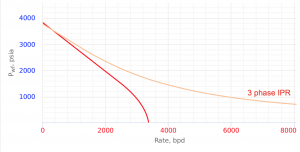Difference between revisions of "3 Phase IPR"
From wiki.pengtools.com
(→Math and Physics) |
(→0 wf wfG) |
||
| Line 28: | Line 28: | ||
:<math> D=A^2-80\frac{q_b}{q_{o_{max}}-q_b}-81</math> | :<math> D=A^2-80\frac{q_b}{q_{o_{max}}-q_b}-81</math> | ||
| − | ===0 < P<sub>wf</sub> < | + | === For 0 < P<sub>wf</sub> < P<sub>wfG</sub>=== |
===And=== | ===And=== | ||
Revision as of 08:36, 11 April 2019
Contents
Three-phase Inflow Performance Relationship

3 Phase IPR Curve [1]
3 Phase IPR calculates IPR curve for oil wells producing water.
3 Phase IPR equation was derived by Petrobras based on combination of Vogel's IPR equation for oil flow and constant productivity for water flow [1].
3 Phase IPR curve is determined geometrically from those equations considering the fractional flow of oil and water [1].
Math and Physics
Total flow rate equations:
For Pb < Pwf < Pr
For pressures between reservoir pressure and bubble point pressure:
For PwfG < Pwf < Pb
For pressures between the bubble point pressure and the flowing bottom-hole pressures:
where:
For 0 < Pwf < PwfG
And
IPR calculator software
- PQplot nodal analysis software is used to calculate the IPR curves. PQplot is available online at www.pengtools.com.
- Excel
- other
Nomenclature
 = formation volume factor, bbl/stb
= formation volume factor, bbl/stb = dimensionless productivity index, dimensionless
= dimensionless productivity index, dimensionless = permeability times thickness, md*ft
= permeability times thickness, md*ft = average reservoir pressure, psia
= average reservoir pressure, psia = average reservoir pseudopressure, psia2/cP
= average reservoir pseudopressure, psia2/cP = well flowing pressure, psia
= well flowing pressure, psia = average well flowing pseudopressure, psia2/cP
= average well flowing pseudopressure, psia2/cP = flowing rate, stb/d
= flowing rate, stb/d = gas rate, MMscfd
= gas rate, MMscfd = temperature, °R
= temperature, °R
Greek symbols
 = viscosity, cp
= viscosity, cp









